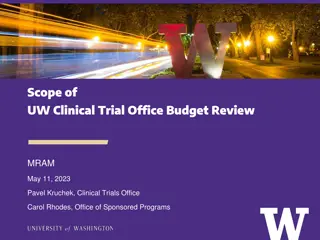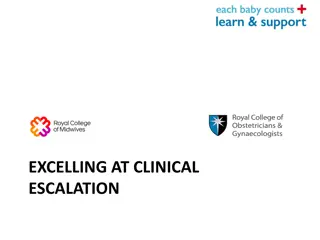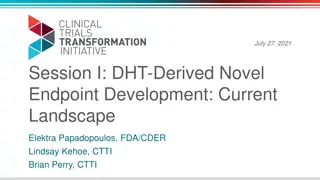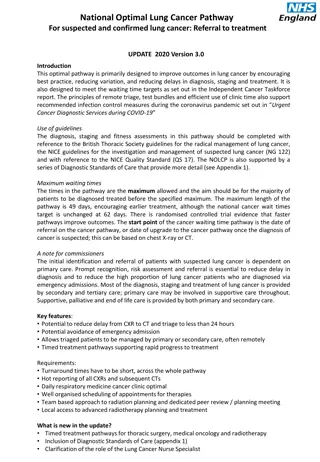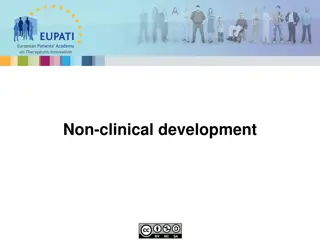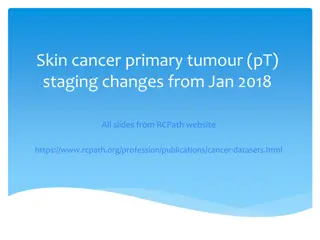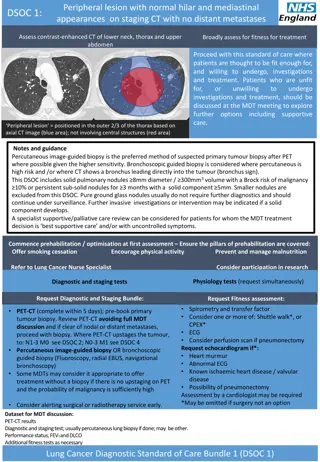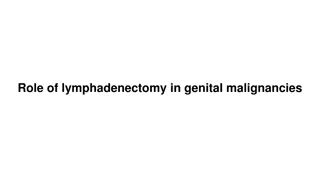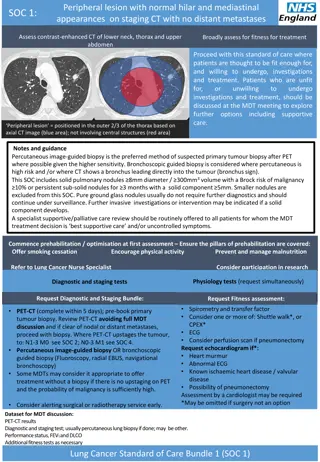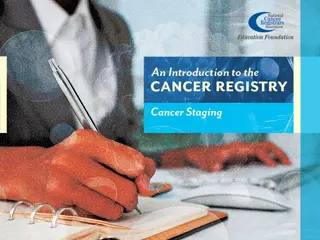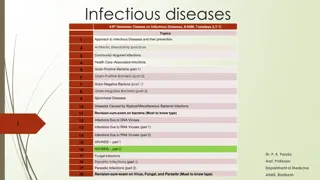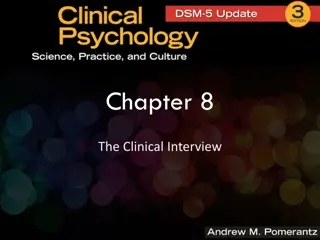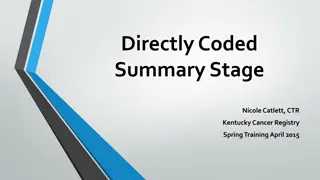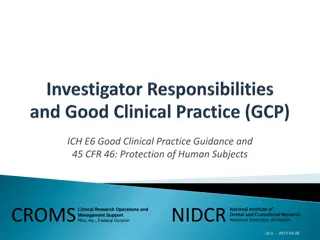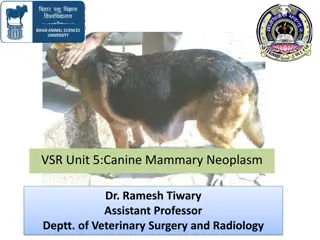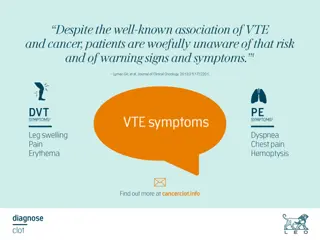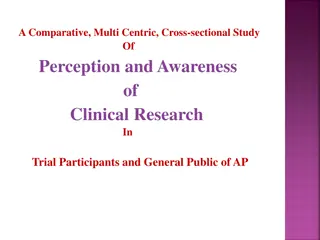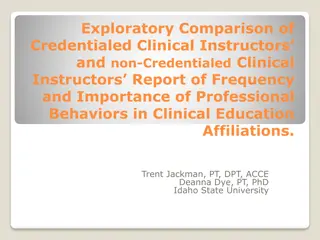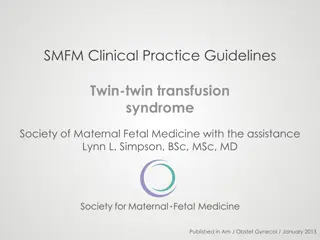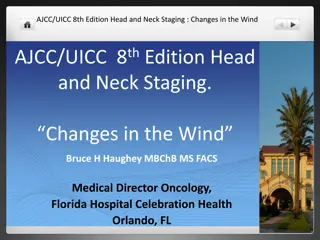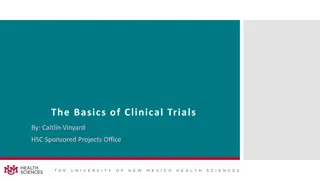Overview of UW Clinical Trial Office Budget Review
UW Clinical Trial Office conducts budget reviews to ensure compliance and financial accountability in clinical trials. The office collaborates with various departments to manage billing compliance, financial risks, and institutional policies. The primary focus is on avoiding patient billing errors,
0 views • 17 slides
India Alliance Clinical & Public Health fellowship in India
India Alliance Clinical & Public Health fellowship in India\n\nIndia Alliance Clinical and Public Health Research Fellowships are for Health researchers with an MD, MS, MPH, or an equivalent clinical or public health degree, who can apply for the DBT\/Wellcome Trust India Alliance Clinical and Publi
0 views • 5 slides
Clinical Escalation: Building Effective Communication in Maternity Units
Exploring the importance of clinical escalation in maternity units, this session outlines the components and practices involved in identifying, communicating, and acting upon clinical concerns. It emphasizes recognizing deviation from normality, effective communication, and taking appropriate action
0 views • 27 slides
Training Models in Clinical Psychology: A Comprehensive Overview
Clinical psychology training models such as the Scientist-Practitioner Model have evolved over the years to integrate science and practical expertise. The Scientist-Practitioner Model, originating in 1949, emphasizes the fusion of scientific knowledge and clinical application. It faced criticism for
1 views • 98 slides
Ethical Issues in Clinical Pharmacy Research by Dr. Haider Raheem Mohammad
Research ethics play a crucial role in clinical trials and therapeutic research in the field of pharmacy. From discovery to validation, all medicines undergo rigorous evaluation processes to ensure safety, efficacy, and freedom from adverse effects. Clinical trials in both animals and humans are ess
0 views • 20 slides
Advanced Clinical Practice Framework and Pillars of Practice
The document discusses the advanced clinical practice framework and the four pillars of practice which include leadership & management, clinical practice, education, and research. It emphasizes the importance of core capabilities and area-specific competence in advanced clinical practice. The role o
2 views • 8 slides
Digital Health Technology-Derived Clinical Outcome Assessments in Regulatory Decision-Making
This session discusses the landscape of DHT-derived novel endpoints in clinical research, focusing on considerations for regulatory decision-making. It explains the use of digital health technology in clinical outcome assessments and highlights the potential benefits of digitally collected COAs, suc
0 views • 42 slides
Objective Structured Clinical Examination (OSCE): A Modern Approach to Assessing Clinical Competence
The Objective Structured Clinical Examination (OSCE) is a modern examination method widely used in the field of health science to evaluate clinical skill performance. It involves stations where medical students interact with simulated patients to demonstrate competencies such as history taking, phys
1 views • 40 slides
National Optimal Lung Cancer Pathway: Referral to Treatment Update 2020 Version 3.0
This optimal pathway aims to improve outcomes in lung cancer by reducing delays in diagnosis, staging, and treatment, while meeting waiting time targets. It emphasizes remote triage, test bundles, and efficient clinic use. The pathway includes maximum waiting times, timely treatment pathways, and gu
0 views • 16 slides
Understanding Corn Growth Stages: Leaf Staging Methods and Considerations
Various leaf staging methods, including the Leaf Collar Method and Droopy Leaf Method, are used to identify corn plant growth stages. The Leaf Collar Method involves counting leaves with visible collars, while the Droopy Leaf Method considers leaves at least 40-50% exposed from the whorl. Factors li
0 views • 9 slides
NIMH Clinical Research Education and Monitoring Program Overview
NIMH's Clinical Monitoring and Clinical Research Education, Support, and Training Program (CREST) aims to ensure the proper conduct, recording, and reporting of clinical trials. This program includes clinical monitoring plans, guidelines for site monitoring activities, and independent clinical monit
1 views • 29 slides
Understanding Statistical Methods for Clinical Endpoints in Diabetes Research
This educational slide module delves into fundamental statistics for analyzing clinical endpoints in diabetes research. It covers the choice of statistical methods, the distinction between statistical and clinical significance, and the importance of different endpoints in evaluating clinical benefit
1 views • 37 slides
Understanding Grading and Staging of Malignant Tumors in Cancer Patients
Grading and staging are crucial in determining the aggressiveness and extent of malignant tumors. Grading involves assessing the level of malignancy based on cell differentiation and mitotic activity, while staging considers the size of the tumor, lymph node involvement, and presence of metastases.
7 views • 31 slides
Understanding Non-Clinical Development in Therapeutic Innovation
The European Patients Academy on Therapeutic Innovation focuses on the non-clinical development phase of medicine, delving into efficacy assessment, safety evaluation, and manufacturing process considerations. Non-clinical studies are essential for decision-making in clinical trials, marketing appli
1 views • 26 slides
Skin Cancer Primary Tumour Staging Changes: RCPath Updates
Explore the latest primary tumour staging changes for skin cancer, including updates from RCPath, datasets for BCC and SCC, changes in TNM classification for skin carcinomas, and upcoming new college datasets. Dive into the evolving landscape of skin cancer staging since January 2018 with detailed s
0 views • 11 slides
Standard of Care for Peripheral Lesion Assessment in Lung Cancer
The provided guidelines outline the standard care pathway for assessing peripheral lesions in lung cancer patients based on staging CT findings. It includes recommendations for biopsy methods, fitness assessment, PET-CT imaging, and considerations for treatment decisions. The protocol emphasizes tai
0 views • 5 slides
Role of Lymphadenectomy in Genital Malignancies
Pelvic and paraaortic lymph node evaluation is crucial in the surgical staging of gynecological malignancies. The goals of lymph node dissection are to determine disease extent and guide further treatment. Pelvic lymph nodes include common iliac, external and internal iliac, obturator, sacral, and p
0 views • 16 slides
Understanding Evidence-Based Medicine and Clinical Decision-Making
European Patients Academy on Therapeutic Innovation emphasizes the importance of Evidence-Based Medicine (EBM) in providing optimum clinical care. EBM involves systematic review and utilization of clinical research for informed decision-making, benefiting patients in disease management and treatment
7 views • 20 slides
Standard of Care for Peripheral Lesion Assessment with Normal Hilar and Mediastinal Appearances
Assessing patients with peripheral lesion on staging CT with normal hilar and mediastinal findings. Further investigation with contrast-enhanced CT is recommended for fitness evaluation and treatment planning. Biopsy methods, diagnostic criteria, and considerations for nodules and nodal staging are
4 views • 5 slides
Understanding Cancer Staging: Purpose, Sources, and Systems
Cancer staging is crucial in assessing the extent of cancer, determining appropriate treatment, and predicting prognosis. This process involves various sources such as physical exams, radiology scans, and pathology reports. Major staging systems like SEER and AJCC help classify cancer stages. Differ
0 views • 17 slides
Approach to Infectious Diseases: Antibiotic Stewardship, Bacterial Infections, and HIV/AIDS Clinical Staging
In the 4th-5th semester classes on infectious diseases, topics such as antibiotic stewardship, community-acquired infections, and various bacterial diseases are covered. The clinical manifestations and WHO clinical staging of HIV/AIDS for adults and adolescents are also discussed in detail. The cour
0 views • 29 slides
Essential Aspects of the Clinical Interview in Psychology
Clinical interviews play a crucial role in the assessment conducted by clinical psychologists, showcasing essential qualities like validity, reliability, and clinical utility. Understanding the importance of feedback and honing general and specific skills as an interviewer are key components in cond
1 views • 17 slides
Understanding Summary Staging in Cancer Cases
Staging cancer cases is a critical process to determine the extent of the disease at diagnosis. Summary staging, including SEER Summary Stage 2000, categorizes cancer spread, combining clinical and pathologic data. Learn about primary staging systems, summary staging groups, and how cancer spreads l
0 views • 41 slides
Analysis of Staging the Spirit in Shakespearean Drama
Exploring the significance of staging spirits in Elizabethan drama, particularly in Hamlet, sheds light on how Shakespeare cleverly blended Protestant and Catholic viewpoints through characters like Horatio and the ghost. The meeting between Hamlet and his father's spirit marks a pivotal moment in t
0 views • 14 slides
Clinical Research Guidelines and Regulations Overview
Clinical research encompasses various guidelines and regulations to ensure the protection of human subjects and the credibility of study results. Key aspects include Good Clinical Practice (GCP) standards, Title 45 of the Code of Federal Regulations (CFR) Part 46, and additional CFR sections for cli
0 views • 46 slides
Ohio Clinical Alliance: Transforming Clinical Experiences
The Ohio Clinical Alliance, through collaborative partnerships, aims to enhance clinical preparation for educators. The leadership team comprises various representatives and organizations committed to improving student learning. Their activities include retreats and meetings to ensure effective comm
0 views • 27 slides
Clinical and Pathological Staging Cases in Oncology
This collection highlights clinical and pathological staging cases in oncology, covering scenarios from colon, lung, bladder, and kidney cancer. Each case presents detailed information on tumor characteristics, lymph node involvement, metastasis status, and clinical stages. Images accompany the desc
0 views • 9 slides
Canine Mammary Neoplasms: Overview and Management by Dr. Ramesh Tiwary
Canine mammary neoplasms, including benign adenomas and malignant carcinomas, are common in intact female dogs. This article discusses the clinical signs, diagnosis methods like FNAC and biopsy, WHO clinical staging system, and the importance of palpating regional lymph nodes for prognosis assessmen
0 views • 15 slides
Understanding the Association of Cancer and Venous Thromboembolism
VTE poses a significant risk for cancer patients, yet awareness of this link and its warning signs is lacking. The detection of VTE during cancer staging and its implications, including incidental findings and clinical correlates, highlight the need for proactive measures in managing this co-occurre
0 views • 5 slides
Perception and Awareness of Clinical Research in Trial Participants and the Public of Andhra Pradesh
This study focuses on understanding the perception and awareness of clinical research among trial participants and the general public in Andhra Pradesh. It highlights the importance of creating awareness about clinical research, previous study results, public attitudes towards clinical trials, and e
0 views • 24 slides
Updates on TNM-8 Staging for Urological Cancers: Insights by John Mitchard
An update by Consultant Histopathologist John Mitchard on TNM-8 staging for urological cancers, highlighting changes in RCC definitions and grading, along with minor adjustments in bladder staging. Details include revised pT3 criteria for kidney tumors, improvements in bladder M1 and T2 classificati
0 views • 14 slides
Client Services Report: Pay Source 9999 County of San Diego
This report provides crucial information on services staging to Pay Source 9999 (Private Pay) in the County of San Diego. It is recommended to run this report monthly towards the end of the month to ensure correct staging. After running the report, check if services are staging correctly and make ne
0 views • 15 slides
Necrotizing Enterocolitis: Causes, Symptoms, Diagnosis, and Treatment
Necrotizing Enterocolitis (NEC) is a serious condition affecting mainly premature infants, with unknown exact causes but potential risk factors like impaired mucosal barrier and feeding issues. Clinical manifestations include feeding intolerance, abdominal distention, and blood in stools. Diagnosis
0 views • 23 slides
Comparison of Professional Behaviors in Clinical Education
Professional behavior characteristics play a crucial role in enhancing student learning during clinical education. This study examines the differences in reported importance and frequency of professional behaviors between credentialed and non-credentialed clinical instructors. The background outline
0 views • 28 slides
Enhancing Clinical Academic Collaboration Between Universities and NHS Trusts
Clinical academics play a crucial role in integrating clinical practice, research, and education within the NHS. Collaboration between universities and NHS trusts is key to ensure clinical academics address the right questions for patient care and societal benefit. Challenges include an aging clinic
0 views • 29 slides
Clinical Practice Guidelines for Twin-Twin Transfusion Syndrome by Society for Maternal Fetal Medicine
This clinical practice guideline by the Society for Maternal Fetal Medicine provides recommendations for the diagnosis and management of twin-twin transfusion syndrome (TTTS). Key points include criteria for TTTS diagnosis, the usefulness of the Quintero staging system, the importance of serial sono
0 views • 18 slides
AJCC/UICC 8th Edition Head and Neck Staging Changes
This content delves into the changes in staging guidelines for head and neck malignancies as per the 8th edition of the AJCC/UICC criteria. It explores the modifications in staging for oropharynx cancer, neck metastatic disease, oral cavity depth of invasion, and cutaneous malignancies. The presenta
0 views • 32 slides
Understanding Clinical Trials: Phases, Types, and Definitions
Clinical trials play a crucial role in advancing medical research and treatment options. This comprehensive guide covers the basics of clinical trials, including their definition, phases, types, and key definitions like IND, IDE, NDA, and more. Discover how different phases of trials work, the vario
0 views • 16 slides
Best Real Estate Staging in Dalrock
Are you looking for the Best Real Estate Staging in Dalrock? Then contact Orderly Fashion LLC. Whether you\u2019re a home owner who wants to DIY or a realtor looking for staging tips, this could be the option for you. \u2018OF\u2019 will consult, sou
0 views • 6 slides
Staging Airbnb Solutions- Elevate Your Rental’s Appeal
Ready to elevate your Airbnb rental? Contact Lovitt by Design for expert staging solutions that turn your property into a guest magnet. Let us help you unlock the full potential of your short-term rental! \n\n\n
1 views • 7 slides
